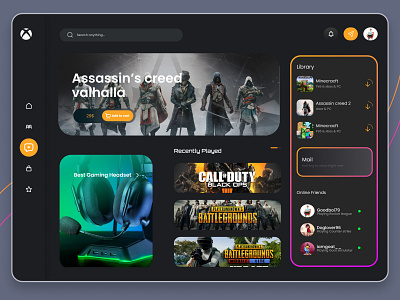1. Why Should an Online Gaming Company Opt for a Cross-Platform Game Development?
Cross-platform game development is a process of developing a robust platform that offers gamers to play the game on multiple platforms, such as mobile phone, desktop, and consoles. Instead of creating different versions of the game for each individual platform, developers develop a single game that eventually opens up the floodgates to a massive ocean of potential users on the app. It's like having the best of all worlds that allows your game to go beyond all the boundaries and reach a larger audience. Key reasons include: increased market reach, enhanced user engagement and retention, cost efficiency, faster updates, competitive advantage, unified player community, future-proofing, diverse monetization options, and penetration of new markets.
2. What is a Game Development Company?
A game development company specializes in creating and developing video games. They are accountable for designing, programming, and developing games for multiple platforms such as consoles, desktops, mobile devices, and virtual reality systems. Top Game Development Companies typically have teams of game designers, programmers, artists, sound engineers, and quality assurance testers who work together to bring the client's vision to a fruitful product.
3. Responsibilities that a best game development company holds
A top game development company holds various responsibilities, including: understanding the client's objective, creating innovative game concepts, designing high-quality gameplay mechanics and UI/UX, crafting visually appealing graphics and animations, producing immersive audio effects and music, conducting thorough quality assurance testing, managing projects efficiently, launching games on multiple platforms, and providing continuous post-launch support and updates.
4. Why should you consider getting your own Web or Mobile Game Development Project?
Developing your own web or mobile game project offers numerous benefits. The mobile game industry is experiencing rapid growth, providing access to a vast and diverse audience. There's significant revenue potential through various monetization strategies. It allows direct engagement with your audience, fostering loyalty and connection. You can showcase your talents, enter a growing market, and potentially build a sustainable business. While competitive, with careful planning and a compelling concept, you can carve out your own space in this dynamic industry.
5. What is Gaming Software?
Gaming software refers to a comprehensive package that includes software applications, APIs, and tools designed specifically for creating, developing, and playing digital games. It encompasses a wide range of components catering to different aspects of the gaming experience, serving both players and game developers.
6. For game developers, gaming software includes:
For game developers, gaming software includes: Integrated Development Environments (IDEs) for coding games, Graphics and Animation Software for creating visual assets, Audio Software for producing sound effects and music, and Game Engines for designing, building, and managing game functionality.
7. Game Development Process
The game development process involves multiple stages: Conceptualization and Pre-production (idea generation, market research, game design document), Design and Prototyping (game art, mechanics, sound design), Development (front-end and back-end), Testing & Quality Assurance, Launching & Deployment, and Post-launch Support & Maintenance. This process is iterative and requires close communication between developers and clients.
8. Data Trends and Insights for game development industry
Key trends in the game development industry include: Rising Mobile Gaming Sector, Shift to Multi-Platform Gaming, Growth of Esports, Advancements in Virtual Reality (VR) and Augmented Reality (AR), Game Streaming and Cloud Gaming, In-Game Monetization, and increased use of Player Data and Analytics.
9. How Much Does it Cost to Develop a Gaming Software
The cost of developing gaming software varies widely based on factors such as game complexity, platforms, team size, and desired features. Simple mobile games may cost $2,000 - $50,000, while complex multi-platform games can cost $5,000 - $85,000 or more. Basic mobile game apps typically range from $1,500 - $30,000, and high-end console games can cost several $10,000 - $100,000+. These are approximate figures, and actual costs can vary significantly.
10. Ask Yourself… Is Gaming Software Right for Me?
Whether gaming software is right for you depends on your individual preferences, interests, and requirements. It can be a great choice if you enjoy interactive experiences, storytelling, and social interactions. Gaming can provide entertainment, stress relief, and mental stimulation. However, it's important to consider time management, maintaining a healthy lifestyle balance, and potential additional costs. Ultimately, gaming software is worthwhile if it aligns with your interests and brings value to your life.
11. How Does Game Development Organization Help Productivity, Performance and Costs?
Game development organizations enhance productivity through specialization, experience, and effective project management. They improve performance through optimization and thorough testing. They can reduce costs through economies of scale, risk management, and efficient resource allocation. Their structure, expertise, and efficiency generally enhance the entire development process.
12. The Pros and Cons of Game Development
Pros of game development include creative expression, entertainment value, skill development, social interaction, problem-solving opportunities, career opportunities, and revenue potential. Cons include complex development processes, high costs, market competition, uncertain returns, potential for crunch time and stress, technological constraints, the impact of player feedback, and the need to keep up with rapidly changing trends.
13. What is the future of Gaming Platforms in the forthcoming times?
The future of gaming platforms looks promising with trends such as continued growth in cloud gaming, advancements in VR and AR technologies, increased use of AI in game mechanics, prevalence of cross-platform gaming, and a focus on player customization and personalization. The mobile gaming industry is expected to continue its rapid growth and evolution.
14. Things to avoid while developing your Gaming Platform
When developing a gaming platform, avoid: unclear requirements and objectives, scope creep, neglecting market research, insufficient testing, ignoring user feedback, choosing inexperienced developers, lack of budget planning, overlooking scalability, neglecting security measures, disregarding legal issues, poor communication, and rushing the development process.
15. Things to keep in mind while giving Your Requirements to your Game Development Company
When providing requirements to a game development company: clearly define your objectives, create a comprehensive Game Design Document, set clear targets and milestones, maintain frequent communication, provide visual references, be open to new ideas, encourage prototyping and testing, be clear about budget and timeline, discuss intellectual property and legal issues, choose the right development team, conduct regular reviews and approvals, and be patient and adaptable throughout the process.






















